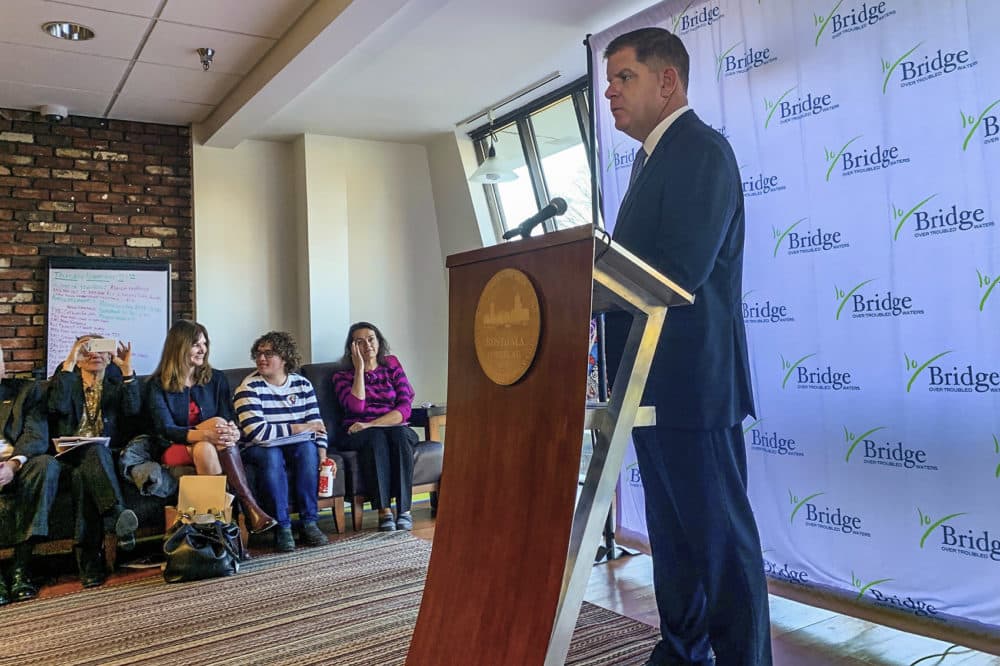Advertisement
Boston Officials, Youth Release Plan To Combat Homelessness Among Young People
The city of Boston plans to provide housing assistance to more than 150 young people without homes as part of its new action plan to combat homelessness among youth and young adults.
Released Thursday, the plan calls for better identification of young people who are homeless or facing housing instability, stronger outreach to them and coordination between social service providers and city agencies in order to prevent and end youth homelessness.
'Flying Under The Radar'
At the point of the 2019 homeless census in January, 325 people between the ages of 18 and 24 were sleeping in Boston's shelters or on the streets.
The city started developing the plan more than a year ago, in partnership with youth homelessness service agencies and the Boston Youth Action Board — a group of teens and young adults who've experienced homelessness or are at risk of homelessness.
Tackling youth and young adult homelessness brings its own challenges different from those of working with older adults experiencing homelessness, according to Laila Bernstein, adviser to the mayor for the Initiative to End Chronic Homelessness and deputy director of the city's Supportive Housing Division.
"A lot of youth and young adults are kind of flying under the radar and not advertising that they're experiencing housing instability or that they may be not in contact with their family," Bernstein said. "And a lot of youth and young adults experiencing housing instability are doubling up or bouncing around ... [many are] fleeing unsafe situations. And so those strategies are different ... and the way to communicate is different."
At the point of the 2019 homeless census in January, 325 people between the ages of 18 and 24 were sleeping in Boston's shelters or on the streets.
Twenty-one-year-old Nick Shoults, a member of the Youth Action Board, helped city officials craft the goals for the plan. He moved to Boston almost three years ago after realizing he couldn't afford to continue attending college in North Carolina. He said he had left his home in Florida because of abuse he suffered in his family, which intensified after he told family members he was bisexual. He bounced around between short-term housing situations when he first came to Boston.
Shoults, who is transgender, is proud of the work he and a diverse group of other young adults did on the plan. But he still worries about young people on the streets.
"I think a lot of [young] people, their voices aren't necessarily included in this plan," Shoults said. "And I think [that's because] they're socially isolated. I think social isolation is a big thing when you're young and homeless."
In July of 2018, the U.S. Department of Housing and Urban Development announced Boston would receive a $4.9 million grant through a competitive application process to fund its youth homelessness initiatives.
Advertisement

On Thursday morning Mayor Marty Walsh announced the recipients of $4.7 million worth of grants from that HUD funding. Those organizations will work with the city to create a portion of the plan's 157 "housing opportunities." Those are units in permanent supportive housing and medium-term rental subsidies.
“We can’t sugar coat it. We can’t build a bunch of shelters and say, ‘OK, there’s no problem on the street now, we’ve got everyone in a shelter, we’ve got everyone hidden,' ” Walsh said during the grant announcement.
“It’s about how do we get people back on their feet," he added. "Get them in a safe space first, and then once they get in that safe space that their whole life isn’t in the shelter system — they can get into an apartment, buy their own home, move forward, have their own family and learn from the very difficult experiences they’ve had."
City officials said they will also dedicate $1 million from the excise tax on short-term rentals and hotel rooms to the youth homelessness plan.
The city estimated it'll have to come up with 285 new housing opportunities for youth and young adults within the next three years.
According to data provided by the city, approximately 50% of people between the ages of 18 and 24 who are homeless in Boston are black, with almost two-thirds of young people using homelessness services coming from the neighborhoods of Roxbury and Dorchester. Between 25% and 29% of youth and young adults experiencing homelessness in Boston identify as LGBTQ. State data suggest that substance use among parents and death of a parent became a greater contributor to youth and young adult homelessness between 2016 and 2017, possibly due to the opioid crisis.
City leaders acknowledged the plan as it exists right now is Boston's vision for ending youth and young adult homelessness but will not lead to immediate concrete action. More planning, coordination and funding are required.
"The plan has a lot of bold ideas in it — a lot of innovative ideas that go beyond what the city can control. It goes beyond city resources," Bernstein said. "So we need to continue to build partnerships and have funders come to the table — community partners who haven't been part of the planning process, but now see pieces of the plan that they can help actualize."
With additional reporting from WBUR's Steve Brown
This article was originally published on November 21, 2019.
